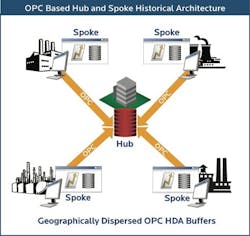History is Built with a Hub and Spoke
The ubiquitous, robust and versatile hub-and-spoke wheels of the Red River carts played a vital role in the life of Western Canada’s original entrepreneurs. Today the hub-and-spoke design is instrumental in creating an OPC standards-based architecture for the collection and analysis of historical process data.Spoke wheeled carts were used for everything by everyone from settlers to fur traders, from Winnipeg to the Rockies. That’s because even in the past people recognized the benefits of standardization. OPC is a published industrial standard for system inter-connectivity. Its purpose is to provide a standards-based infrastructure for the exchange of process control data. OPC HDA, or Historical Data Access is the OPC standard used to exchange archived process data between an application and any data-archive in a consistent manner. Everything and the kitchen sink?Data historians are used by many manufacturing environments that employ process control, supervisory systems or other execution functions requiring real-time data. Databases are used to solve a wide range of problems including efficiency improvements, statistical process control, quality assurance and reporting. In the past a central monolithic historian solution was touted as the only way to capture and manage process history. Vendors worked very hard to sell the virtues of their “complete” history solution, with each implying the historian must be in a single location. The “enterprise historian” was touted as the silver bullet for the history collection/processing needs of an organization. The problem with this vision is the cost of bringing all data to one location, the cost of committing to the single vendor for the storage and presentation/analysis of historical data, and the cost of the total solution. With a distributed historian model, the history is located at the source where it is most needed.The spoke wheeled carts were strong, yet light-weight, easy to maintain, and could be broken down to float across river obstacles. Process history applications should be just as flexible. Instead of forcing all data to a single enterprise historian, history can be distributed across the organization. Using low-cost, zero maintenance OPC HDA based process historians, process data can be historized, analyzed, and managed at the data source. The low cost of ownership and simplicity, combined with the data storage power of the OPC standards based products enable deployment of the history solution directly at the source. Data collection and analysis can occur at the operation level. Powerful hub and spoke designJust as OPC DA (Data Access) standardizes on how real-time data is exchanged, the OPC HDA (Historical Data Access) specification standardizes on how historical data is transferred. Multiple OPC HDA based historians can be combined to create a true distributed historian solution: a history solution with both geographic and data capacity. Utilizing the OPC HDA interface, multiple OPC enabled process historians can be linked together to bring multi-site analysis to historical data Hubs. Instead of bringing all data to a history Hub location, only data that is required for analysis needs to be consolidated. If loop analysis is being performed for several plants or Spoke locations, only one copy of the analysis software needs to be purchased if the relevant loop data is brought to a single location for processing. The data that is required for the operations tier can stay where the data is being produced. Any process historian can become a history Hub using OPC. Current enterprise process historian solutions create high value for many companies. The decision to partner with an enterprise historian vendor for process history management, analysis, and visualization is one that is typically made after a great deal of research. Many companies have recovered the initial costs of the enterprise historian in the first year. A localized OPC HDA based historian adds extreme value to existing enterprise historian deployments. Many organizations are placing the OPC historian solutions into targeted areas to reap the benefits of detailed analysis outside the scope of the enterprise historian. Learn from historyOPC based hub-and-spoke architecture addresses many individual problems manufacturers are currently facing, including reliability, accuracy, maintainability and affordability of historizing process data. A hub-and-spoke solution is based on a number of individual OPC technologies whose purpose is to reliably move process and business data from remote locations to a central repository. OPC HDA empowers architectures that not only provide, at the source, analysis and guaranteed data delivery, but also flexibility in which products and configurations are used to achieve this functionality. For information on OPC solutions from MatrikonOPC, based in Edmonton, Alberta, Canada, visit www.matrikonopc.com.

